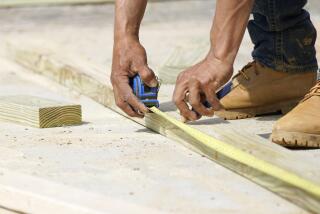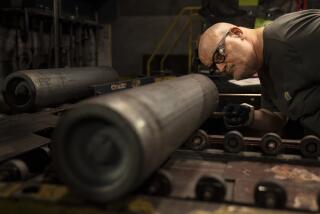Opportunity Still Knocks During an Economic Slowdown
- Share via
A weaker economy doesn’t necessarily mean it’s a bad time to start or expand a business. It does mean entrepreneurs need to do some extra projections and soul-searching before making any big moves.
“Even if you’re in a declining economy, some industries will do well,” said William Dunkelberg, chief economist with the National Federation of Independent Business. “Do your research carefully.”
“If you found an opportunity . . . you should go in,” agreed Andrew Zacharakis, a professor of entrepreneurship at Babson College in Massachusetts.
There’s no denying that the slowing economy has prompted many would-be business owners to rethink their plans.
“Entrepreneurs are driven to start a business when they see people doing well in it,” Zacharakis said. “But when they see the dot-com failure of the day, . . . that has an impact, especially when it’s a high-profile company.”
Existing businesses that want to expand also are plagued with doubts. Just 12% of business owners believe this is a good time to undertake an expansion, the lowest level since 1991, Dunkelberg said. Last year, before the economic slowdown became evident, that figure was at a record high of 28%.
That shift in sentiment comes as sales and profits are down for many companies. Another reason is that money is tighter--bankers are more cautious about making business loans.
Banks are “doing their due diligence a little more in depth,” said Sharolyn Craft, director of the Small Business Development Center at the University of Nevada, Las Vegas. “They’re not as likely to do start-ups as they might have in the past.”
But it’s important to note that in some parts of the country and some industries, the economy hasn’t taken that big a hit, so entrepreneurs are more willing to take chances. Craft, for example, noted that the convention and trade show business, a big part of the Las Vegas economy, tends to pick up during slowdowns. She doesn’t find local entrepreneurs and business owners feeling as pressured.
For some entrepreneurs, an economic slowdown might be the best setting for a start-up. And it might make sense for existing businesses to think about expanding.
“Space is the cheapest, people are available and equipment is cheaper,” Dunkelberg said. “Other companies are going out of business and entry costs could be lower.”
Of course, there’s the problem that “it’s hard to get the sales you need when the market is shrinking,” he said.
The key to a successful business in any economy is very careful planning, including a realistic evaluation of your target market, costs of creating products or delivering services and, of course, how you’ll fund this new or expanded enterprise. If you’re a prospective entrepreneur, you also need to think hard about the amount of money you’ll need from the business for your own living expenses.
This all means asking yourself a lot of tough questions. To be sure you consider all sides of starting a business, check out guidebooks on starting businesses in bookstores, or consult the Small Business Administration’s Web site (https://www.sba.gov).
You can get free or very low-cost help from the SBA-sponsored Small Business Development Centers, many of which are housed at universities and colleges around the country. Also try SCORE (https://www.score. org), a network of retired executives offering help to small businesses.
If your heart is set on running a business but it’s not feasible to start one from scratch, you might consider buying an existing business. You’d still need to ask yourself a lot of the same questions--perhaps the most important question is why the current owner is selling.
If it’s because the business is doing poorly in a slowing economy, and the changes you envision aren’t likely to help, this might not be the business you want to buy.
More to Read
Inside the business of entertainment
The Wide Shot brings you news, analysis and insights on everything from streaming wars to production — and what it all means for the future.
You may occasionally receive promotional content from the Los Angeles Times.










